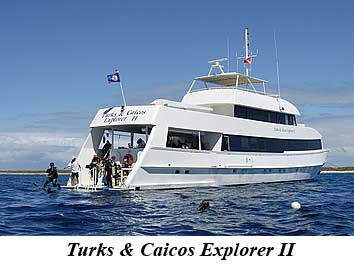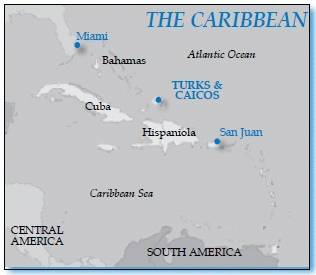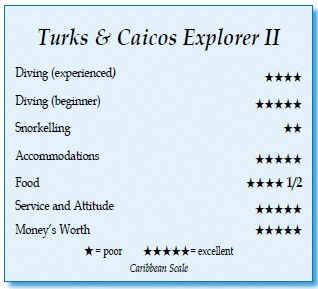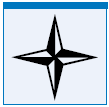Turks & Caicos Explorer IIContents of this Issue: When Shark Shields and Great Whites Collide Sunscreens that Protect Divers as well as Reefs Thanks to Our Subscribers, We’re Giving Away $3,000 You Don’t Have to Start a Nonprofit to Do Good How to Avoid a Flight from Hell A Diver with Heart Issues: Could His Death Not Be Accidental? Can Divers’ Potentially Fatal Heart Changes Really be Found? Editorial Office: Ben Davison Publisher and Editor Undercurrent 3020 Bridgeway, Suite 102 Sausalito, CA 94965 Plenty of fish - - and mysterious gnomes from the October, 2013 issue of Undercurrent
Dear Fellow Diver: It had been 500 dives since I was last aboard the Turks & Caicos Explorer II, and I was eager for a repeat. While packing, I decided to leave my out-sized magnifying glass at home, figuring I wouldn't need it. Wrong! On my third day, at Elephant Ear Canyon, the search was on for sea slugs in a large sandy area speckled with sea grass. And behold: a leech headshield slug in its orange, blue and black vertical stripes, not more than half an inch long. Another sea slug nearby had white and black horizontal dots. And there was a white-spotted sea hare, smaller than one inch. Caribbean macro heaven and a great trip. Though the shark that was rudely punched in the snout may not think so.
The seven-member crew created a familyfriendly atmosphere. Ken Kimmey has captained the boat for four-plus years. Mark, the Jamaican engineer, has been aboard four years. Stan, the chef -- forever. Maria, the purser, and dive instructors Simon, Casey and Martin were more recent additions. Three have a history with the theatre, and it showed with their good-natured banter and Martin's wild water entries and dance moves. Maria's quips hinted at her previous career as a stand-up comedian. However, their no-nonsense demeanor took over when it was time to gear up -- they checked equipment, made sure air was on, and carried fins to the dive platform. During the dive briefing, Captain Ken, in his folksy manner, emphasized that this was "our trip" and they were there to make it as good as possible. As a single diver on board, I buddied up with Petros, a Greek in his late 30s who teaches physics at the International School in Oman. Boris and Konst, a Ukrainian-born, Canadian-residing father and college-freshman son, had been diving three years. On one dive, Konst dropped to 105 feet, deeper than the group, then after checking his computer, he quickly ascended to his father, who was above the group, and they returned to the boat. On deck, Konst fretted about his rapid ascent and requested oxygen, though he was symptomless. A crew member called Divers Alert Network, then administered oxygen for an hour. Konst felt fine, but was not allowed to dive for 24 hours. As for the other twosome aboard, I often saw one chasing down her wandering buddy. We became a convivial group, eating meals together with the crew at the three tables. We socialized on the open-sided, canvas-top-covered flydeck (it was also the dedicated area for the two smokers). It had a small fridge stocked with beer and soda; all beverages were complimentary.
Diving became progressively better after our first stop at Northwest Point in Providenciales, then off to West Caicos and finally French Cay before returning to West Caicos. All my dives began by dropping down to cruise the wall, then rising to 45 feet to sandy flats with colorful coral heads. While soft corals were few, there were lots of sponges, whips, and sea fans on the walls. Jawfish and garden eels were commonplace. Occasional peacock flounders with their distinctive blue-ring markings glided down to land on a coral. Large lobsters sequestered themselves in crevices, while a few walked about freely (it was two weeks before lobster season started). Twilight dives revealed large crab navigating the wall. On most dives, there were a couple of lionfish, and reef sharks ranging from one to several. Large grouper and barracuda roamed the sites. I spotted flamingo tongues on all dives, and at Dax Canyon in French Cay, I found two fingerprint cyphoma and one spotted cyphoma. I always entered the water with a giant stride off the six-foot-long entry deck, while other divers took the five-foot side-entry drop. Because the boat was moored only by a line from the bow, the boat would swing a full 180 degrees in roughly a figure-eight pattern. To dive with a guide, we were instructed to hold onto the trailing rope before descending; otherwise, head straight down with your buddy. Once, upon return, as my buddy and I were enjoying a fast ride on the hang-line, the boat swept its arc and I heard a loud noise. Not knowing what it was, I didn't lose time exiting the water. Turns out, the mooring pin broke. (When I was previously on this vessel, no amount of skill with the compass helped me find the boat when the pin broke and the boat drifted away). A chase boat was always in the water but never used; Captain Ken made it clear in his briefing that it was not a taxi. The days began with breakfast at 7 a.m., then an 8 a.m. dive, snack, 10:30 a.m. dive, lunch at noon, 1:30 p.m. dive, snack, 4 p.m. dive, snack, then either a 6:30 p.m. twilight dive before dinner or a night dive after dinner. When two of us voiced a preference for twilight rather than night dives, we got them on three days. On the last day, we did a dawn dive at 6 a.m., followed by breakfast, then a dive at 8 a.m. When we once tried to enter after just an hour of surface time, it was no go; Casey said insurance rules dictated a minimum of 90 minutes between dives. Other rules: return with 500 psi, do a buddy dive or have a solo certification (offered on board), and max dive time is 60 minutes. If any diver had not surfaced in 70 minutes, they would initiate a search. It wasn't necessary. Northwest Point had quite a bit of algae growth where the corals had been sand-blasted during previous storms. That did not deter the usual fish -- large grouper, garden eels, squirrelfish, blue-headed wrasse, parrotfish, clown wrasse, honeycomb cowfish, spotted and smooth trunkfish, and the ever-present black durgon. At Eel Garden's wall, I spotted a pipefish with its tail wrapped around wispy growth along the undersea communication cable line. The Amphitheater had a sand plateau full of coral fairy chimneys, where colorful small fish swarmed, including clown wrasse in all their color and pattern variations. Two small morays, spotted and goldentail, were well hidden. Over the wall, there was an impressive cascade of plate coral, and at 85 feet was a large elephant ear sponge, with black coral and an orange rope sponge. The spacious dive deck had bins underneath benches, and we hung our wetsuits in the middle. Crew members filled tanks in place (usually to 3000 psi), and oxygen analyzers recorded nitrox percentages (the range was from 33 to 35.6). Dedicated to cameras were a deep rinse tank, a large table and lint-free drying towels (oddly, only one diver toted a camera). Two metal containers had fresh water and chemicals (changed twice daily) for gear,and two even smaller ones for masks. The crew gave good briefings with hand-drawn charts. When I exited the water, a crew member recorded my psi and depth -- and that I was back on board. On a twilight dive at Rock Garden in West Caicos, the fish were out in force. Harlequin bass flitted above coral rubble. A large reef shark showed a battle scar that looked like something took a big bite out of its fin,(or maybe a propeller was the culprit). Another shark had a hook in the side of its mouth. Presumably, it will rust away.
Reaching the best diving at French Cay is not always a given. Weather can make the 17-mile trip from West Caicos too rough to travel, but the sea goddess blessed us. Dolphins swam alongside the boat and underwater, the number of fish, intensity of coral colors, and water clarity increased considerably. Plus, no algae on the reef. A couple of spotted eagle rays welcomed us, and reef sharks made loops. Juvenile and adult spotted drum hid under ledges. At Rock and Roll, while Boris was trying to get a good shot of a stingray, a curious nurse shark swam up to him. Boris hit it in the snout. It darted away. My pissed-off buddy, making a beeline to Boris, honked his air-horn and rattled his shaker. Crossing his arms in a stop-that signal, he swam up to Boris. I could even hear the loud, angry shouts through their regulators. I expected an underwater fistfight, but each angrily moved away from the other. Regardless, the shark who had suffered this indignity followed Boris for the remainder of the dive. On board, the two divers avoided each other for a day, eating at separate tables. For some reason, Boris did not dive the next two dives. Angling to catch one of the two hang-lines at French Cay became more of a challenge as the wind swung the moored boat at a good clip. Lousy at judging the trajectory, I hung close to my buddy at the safety stop and shadowed him while he waited at the right "bus stop" for the speedy swing-by. Trying to fin to catch it would have been a losing race. After five great dives at French Cay, the worsening wind and waves led Captain Ken to depart for West Caicos and Spanish Anchor. There, I spent 20 minutes at twilight watching two white-spotted filefish, one in orange phase and one in olive brown. Swimming around each other, they came side by side with tail fins flicking. As they ascended together, tail fins flared and colors on both changed. I've seen courtship dances before, but never so graceful and poignant. On our last day, we dived Spanish Anchor again. At the end of the cut in the wall, leading to the anchor at 100 feet, there was a colorful ceramic statue of a grinning gnarly gnome (I saw another in Northwest Point's waters). The little guy was a foot tall, with the typical red conical hat, and perched on a recessed ledge. No one knows how the gnomes got to the sites, but I hear they've been there a long time; fable says they guard buried treasure. But was it the work of a selfproclaimed underwater gnomeplanter- dive-instructor from Scotland? (see sidebar) The last dive of the trip was Magic Mushroom, where I watched a territorial battle between two 12-inch redband parrotfish, going in circles with their mouths locked onto each other's mouth. They would separate and then go at it again. On this last dive of the trip, my dive buddy and I spotted a fish unique to both of us, a beautiful pearly, almost translucent all-white critter, more butterfly-shaped and sized than anything else, with two black spots, one near the eye, the other the tail. Must be the magic of the mushroom! After five trips with Explorer Ventures, I still find them consistent in their high quality of product -- crew, boat maintenance and safety. With the easy diving, the Turks & Caicos Explorer is great for beginning and intermediate divers; advanced divers can find their pleasures, too, but have to work at it. And don't forget your magnifying glass. -- J.D. PS: The seventh passenger on my trip was Wyoming resident Clay McCardell, owner of Explorer Ventures, who was visiting (but not diving). Clay established Explorer Ventures in 1987, and now has a fleet traveling the waters in Turks and Caicos, Saba/St. Kitts, the Maldives, the Galapagos and the Bahamas. A great storyteller, Clay is an enthusiastic, affable and adventurous fellow who loves motorcycles, flying, horses and, of course, diving.
|

I want to get all the stories! Tell me how I can become an Undercurrent Online Member and get online access to all the articles of Undercurrent as well as thousands of first hand reports on dive operations world-wide
| Home | Online Members Area | My Account |
Login
|
Join
|
| Travel Index |
Dive Resort & Liveaboard Reviews
|
Featured Reports
|
Recent
Issues
|
Back Issues
|
|
Dive Gear
Index
|
Health/Safety Index
|
Environment & Misc.
Index
|
Seasonal Planner
|
Blogs
|
Free Articles
|
Book Picks
|
News
|
|
Special Offers
|
RSS
|
FAQ
|
About Us
|
Contact Us
|
Links
|
3020 Bridgeway, Ste 102, Sausalito, Ca 94965
All rights reserved.

 The 124-foot boat was just as comfortable and
clean as I remembered. Ten large, individually airconditioned
cabins with bathrooms and sinks can hold
20 divers (six were on this trip.) The cabin configurations
include bunks, side-by-side singles separated
by a small dresser, and two king-bed master staterooms
on the upper deck. My bed was firm and comfortable,
with soft sheets. The ride was smooth, thanks to the
vessel's stabilizers, although during the French Cay
crossings, one queasy
fellow spent a lot of
time in his bunk.
The 124-foot boat was just as comfortable and
clean as I remembered. Ten large, individually airconditioned
cabins with bathrooms and sinks can hold
20 divers (six were on this trip.) The cabin configurations
include bunks, side-by-side singles separated
by a small dresser, and two king-bed master staterooms
on the upper deck. My bed was firm and comfortable,
with soft sheets. The ride was smooth, thanks to the
vessel's stabilizers, although during the French Cay
crossings, one queasy
fellow spent a lot of
time in his bunk. The trip was seven nights, with 27 dives over five days. One night dive was
said to be "so-so," so we skipped it to recap the day during cocktail hour. The
water temperature averaged 83 degrees, visibility ranged from 60 to more than
100 feet, and my dives varied between 64 and 100 feet deep. Days were sunny,
averaging 86 degrees, and the breeze kept us cool while lounging on the decks.
While we occasionally saw the Turks & Caicos Aggressor II moored in the distance,
we had every dive site to ourselves.
The trip was seven nights, with 27 dives over five days. One night dive was
said to be "so-so," so we skipped it to recap the day during cocktail hour. The
water temperature averaged 83 degrees, visibility ranged from 60 to more than
100 feet, and my dives varied between 64 and 100 feet deep. Days were sunny,
averaging 86 degrees, and the breeze kept us cool while lounging on the decks.
While we occasionally saw the Turks & Caicos Aggressor II moored in the distance,
we had every dive site to ourselves. After another diver and I expressed
an interest in a drift dive, our accommodating
Captain Ken arranged a dive
at Spanish Anchor, with Casey towing a
float for the captain to follow. Trouble
was, there never was a wisp of current.
So with no easy drifting, we divers
needed a lot of energy, and Chef
Stan dished it out. Of course, one of
the topics at the dinner table was how
many calories one actually burns diving,
and the responses widely varied [Note
from Ben: See Undercurrent, May 2013 for
the latest information]. On the first
night, it was roast beef, gravy, roasted
potatoes, salad, vegetables and key
lime pie. Other dinners included tender
grilled steaks with delicious mushroom gravy; pork tenderloin with gravy, applesauce, slaw and rice; ribs, baked
beans, and cornbread; and the last night's traditional turkey dinner with all
the trimmings. (Vegetarians, let them know your food preferences before you travel.)
Nightly soups were tasty, especially the conch chowder. Hamburgers, tacos,
sandwiches and lasagna were among the lunch fare. Snacks never let us down with
cake, cookies, pizza, brownies, muffins, and cheese and crackers. Fresh fruit was
always available, as were jars of cookies, candy and peanuts. Varying breakfasts
included surprises of French toast, pancakes, omelets, sausage or bacon, and
always sliced fruit. On our last night, we went ashore for dinner.
After another diver and I expressed
an interest in a drift dive, our accommodating
Captain Ken arranged a dive
at Spanish Anchor, with Casey towing a
float for the captain to follow. Trouble
was, there never was a wisp of current.
So with no easy drifting, we divers
needed a lot of energy, and Chef
Stan dished it out. Of course, one of
the topics at the dinner table was how
many calories one actually burns diving,
and the responses widely varied [Note
from Ben: See Undercurrent, May 2013 for
the latest information]. On the first
night, it was roast beef, gravy, roasted
potatoes, salad, vegetables and key
lime pie. Other dinners included tender
grilled steaks with delicious mushroom gravy; pork tenderloin with gravy, applesauce, slaw and rice; ribs, baked
beans, and cornbread; and the last night's traditional turkey dinner with all
the trimmings. (Vegetarians, let them know your food preferences before you travel.)
Nightly soups were tasty, especially the conch chowder. Hamburgers, tacos,
sandwiches and lasagna were among the lunch fare. Snacks never let us down with
cake, cookies, pizza, brownies, muffins, and cheese and crackers. Fresh fruit was
always available, as were jars of cookies, candy and peanuts. Varying breakfasts
included surprises of French toast, pancakes, omelets, sausage or bacon, and
always sliced fruit. On our last night, we went ashore for dinner. Divers Compass: I made liveaboard reservations directly with
Explorer Ventures¸ and paid $2,295 for a single willing-to-share
cabin; Live Chat is a real bonus in making reservations, and
staff are quick with knowledgeable responses . . . Nitrox for
the week was $150, the fuel surcharge and Turks and Caicos hotel
tax totaled just under $210 . . . Turks and Caicos is 550 miles
and a 90-minute flight southeast from Miami to Providenciales;
it comprises 40 islands and cays, eight of which are inhabited
. . . The U.S. dollar is the currency, English the language .
. . I stayed at the Ports of Call Resort, a few minutes' walk to a few openair
restaurants and the long, pristine, white-sand beach of Grace Bay, where I
snorkeled and noted that the only interesting critters were 15 large cushion
sea stars scattered about the sand . . . Websites:
Divers Compass: I made liveaboard reservations directly with
Explorer Ventures¸ and paid $2,295 for a single willing-to-share
cabin; Live Chat is a real bonus in making reservations, and
staff are quick with knowledgeable responses . . . Nitrox for
the week was $150, the fuel surcharge and Turks and Caicos hotel
tax totaled just under $210 . . . Turks and Caicos is 550 miles
and a 90-minute flight southeast from Miami to Providenciales;
it comprises 40 islands and cays, eight of which are inhabited
. . . The U.S. dollar is the currency, English the language .
. . I stayed at the Ports of Call Resort, a few minutes' walk to a few openair
restaurants and the long, pristine, white-sand beach of Grace Bay, where I
snorkeled and noted that the only interesting critters were 15 large cushion
sea stars scattered about the sand . . . Websites: 